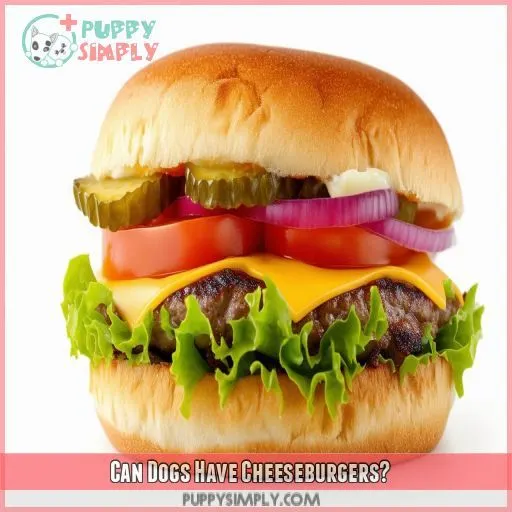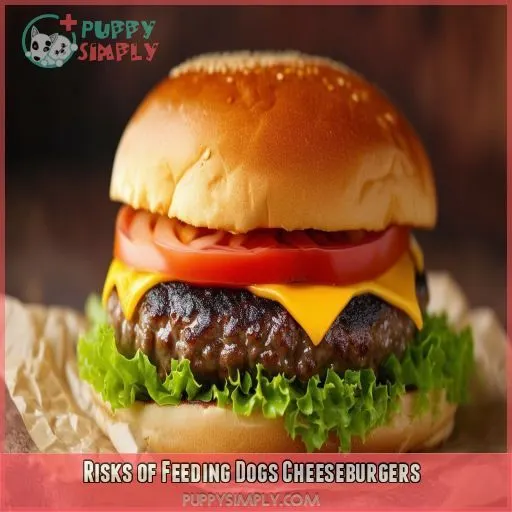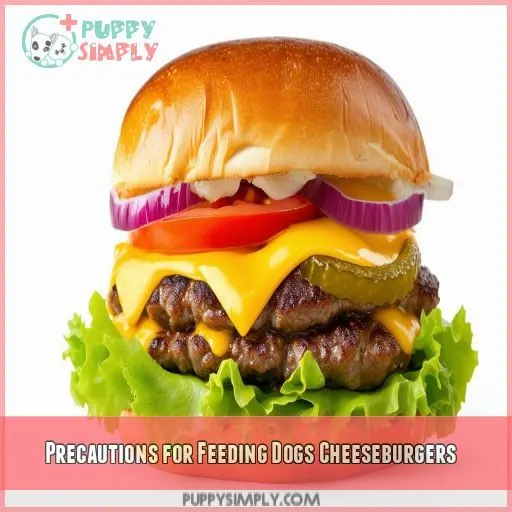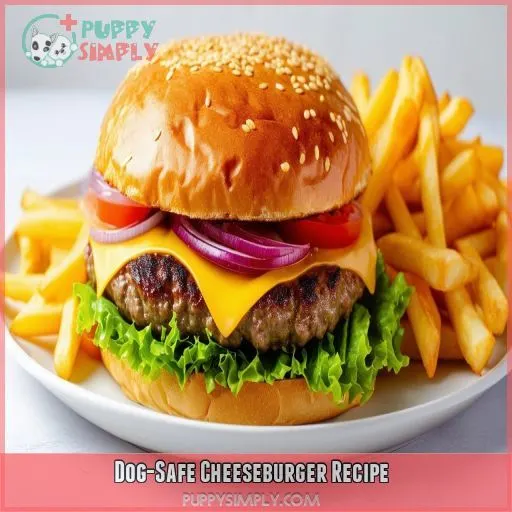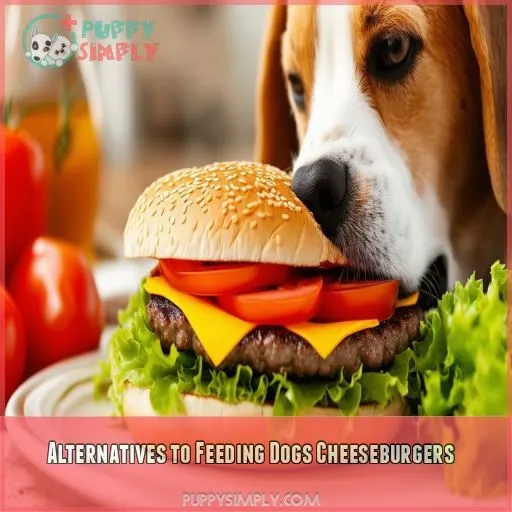This site is supported by our readers. We may earn a commission, at no cost to you, if you purchase through links.
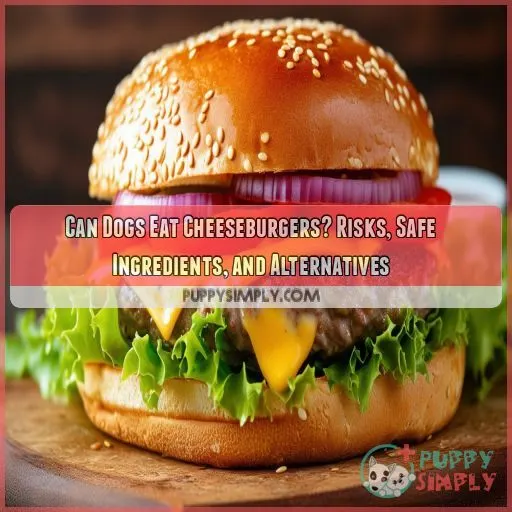
Knowing risks, safe ingredients, and proper portions is crucial for the long-term well-being of your dog. Let’s explore potential dangers, precautions, and healthier alternatives that will ensure you treat your dog safely and responsibly.
You’ll understand how to protect your pet by the choices you make.
Table Of Contents
- Key Takeaways
- Can Dogs Eat Cheeseburgers?
- Can Dogs Have Cheeseburgers?
- Risks of Feeding Dogs Cheeseburgers
- Precautions for Feeding Dogs Cheeseburgers
- Dog-Safe Cheeseburger Recipe
- Alternatives to Feeding Dogs Cheeseburgers
- Frequently Asked Questions (FAQs)
- Is it okay to give your dog a cheeseburger?
- What happens if my dog eats a burger?
- Can I give my dog a cheeseburger for his birthday?
- Can dogs have McDonald’s beef patty?
- Can dogs eat cheeseburgers?
- What meat should I never feed my dog if they have dementia?
- Can dogs eat burgers?
- Can a dog eat a cheeseburger if he is lactose intolerant?
- Can dogs eat cheeseburgers every day?
- Are there lactose-free cheese options for dogs?
- How does feeding dogs fast food affect them?
- What are the signs of salt poisoning in dogs?
- Can dogs have homemade hamburger buns?
- Conclusion
Key Takeaways
- Treat your furry friend to a plain hamburger patty instead of a cheeseburger to avoid potential health risks.
- If you must share a cheeseburger, opt for homemade versions with lean ground beef and low-fat cheese, and watch portion sizes.
- Monitor your dog closely for any allergic reactions or digestive issues after trying new foods.
- Remember, moderation is key – an occasional plain hamburger patty as a treat won’t hurt, but don’t make it a regular indulgence.
Can Dogs Eat Cheeseburgers?
Yes, dogs can consume cheeseburgers, but not ideally. Versions from fast food are definitely out of the way, including harmful ingredients like onions and garlic and excess fat.
Should you want to treat your pooch, stick to just a plain cooked beef patty made of lean meat with very minimal fat**. Use low-fat cheese sparingly and, of course, without the usual buns. Keep a close watch for allergy and digestive issues, remembering moderation is always the key.
Homemade ones can be safe, but the best way is to consult your vet. Follow these, and he will be all healthy and happy. Want to know the details?
Can Dogs Have Cheeseburgers?
Dogs can eat cheeseburgers, but there are things to consider first. Moderation is the key, and of course, the burger itself won’t be harmful to your fur baby. Just plain cooked beef, with no flavorings or seasonings, is best.
Avoiding low-budget fast-food cheeseburgers and including homemade versions in your diet instead is advised, as they involve the use of lean ground beef and low-fat cheese. Keep watch on the canine size vis-à-vis the portion sizes, and ensure that you feed in small portions only once in a while.
It’s always a good idea to consult veterinary care for every new food pursued. Allergic reactions may be a factor, so watch any reaction your dog has to new ingredients.
Risks of Feeding Dogs Cheeseburgers
Feeding dogs cheeseburgers can pose health risks such as digestive issues, pancreatitis, and potential exposure to harmful ingredients like onions and garlic. Additionally, allergies and sensitivities to dairy or certain meat additives may arise, making careful monitoring essential.
Health Concerns
Feeding dogs cheeseburgers poses several health concerns:
- Hamburger ingredients: High salt and sugar content can lead to liver failure and pancreatitis.
- Toxicity: Onions are toxic and can cause severe health issues.
- Bacteria: Raw beef may contain Salmonella and E. coli, leading to diarrhea and other serious infections.
Always consult a vet for professional advice.
Allergies and Sensitivities
Cheeseburgers could trigger allergic reactions or food intolerance in your dog. Ingredients like garlic and onion are harmful, causing adverse effects. Digestive issues are common, so always monitor portions and avoid condiments and toppings. Instead, consider making homemade dog-safe hamburgers with simple, nutritious components, ensuring your pet enjoys a tasty but safe treat.
Precautions for Feeding Dogs Cheeseburgers
While feeding cheeseburgers to dogs, try to make them safe by using lean, plain beef and controlling the portions so as not to overfeed. Observe any allergies or sensitivities your dog might show to new foods, and consult with your vet in case of any doubt about introducing a new food into their diet.
Safe Ingredients
To make cheeseburgers safe for dogs, use lean ground beef and skip the seasonings. Opt for buns made from whole wheat or oat flour with unsweetened applesauce, and choose low-fat or reduced-fat cheese. Prioritize safe cooking and proper storage.
Portion Control
When considering your pup’s diet, ensure hamburger treats are kept to a minimum. A little plain hamburger that’s cooked typically won’t hurt anything. Just make sure not to overfeed, and if you do, be sure the grilled meats don’t have bones and are well-cooked to avoid health problems.
Allergy Monitoring
One should be highly conscious of allergic reactions or sensitivities while feeding cheeseburgers to dogs. Observe any signs of discomfort, such as itching, swelling, gastrointestinal upset, etc. By starting with small portions and gradually increasing, ensure one prevents allergies due to continuous sensitivity monitoring.
Dog-Safe Cheeseburger Recipe
For a dog-friendly cheeseburger, you’ll want to use lean ground beef for the patty, whole wheat or oat flour for the buns, and low-fat cheese. These ingredients will ensure a much healthier treat sans the bad additives for your dog.
Beef Patty
Use lean ground beef for maximum health benefits. Grill or bake without adding oils. Make the patties of medium thickness and trim in portion size so as not to overfeed. This way, your dog will have a safe treat.
Bun
Consider dog-friendly substitutes for the bun. Use whole wheat buns or bake your own:
- 1 cup whole wheat flour
- 1 cup oat flour
- 1/2 cup unsweetened applesauce and 1/4 cup water
Shape, bake in the oven, and serve.
Cheese
For a dog-safe cheeseburger, opt for low-fat or reduced-fat cheese. Cottage cheese or plain, unsalted, unseasoned shredded cheese are also great options. Avoid feeding too much cheese, as it can cause digestive issues.
| Cheese Type | Suitability |
|---|---|
| Low-fat or reduced-fat cheese | ✓ |
| Cottage cheese | ✓ |
| Plain, unsalted, unseasoned shredded cheese | ✓ |
Alternatives to Feeding Dogs Cheeseburgers
Instead of giving your dog cheeseburgers, consider offering plain ground beef or safe dog treats. You can also engage them in enjoyable activities like walks or trips to the dog park to keep them happy and healthy.
Plain Ground Beef
Plain ground beef is a great alternative, offering lean protein for weight loss and muscle building. Consider these options:
- Homemade treats with plain, cooked beef.
- Use beef as a training reward.
- Mix beef with kibble for variety.
Safe Dog Treats
Switching from cheeseburgers to safe treats boosts your dog’s nutrition. Opt for dog-friendly snacks like carrot sticks, apple slices (no seeds), or plain rice cakes. Here’s a handy table:
| Treat | Benefits | Serving Size |
|---|---|---|
| Carrot Sticks | Low-calorie, promotes dental health | 1-2 sticks |
| Apple Slices | Packed with vitamins, avoid seeds | 1-2 slices |
| Plain Rice Cakes | Easy to digest, simple carbs | 1 cake |
| Blueberries | Antioxidants, fiber-rich | Small handful |
| Cooked Sweet Potato | High fiber, vitamin A | 1 slice |
Other Enjoyable Activities
Instead, take your pup on a refreshing walk go frolic around the dog park, or even enjoy a sun-kissed day at the beach bonding experience to help make them healthy. Playtime and socialization are great substitutes for unhealthy snacks.
• Energizing visits to a dog park
- Refreshing beach adventures
- Quality time with their favorite human
Frequently Asked Questions (FAQs)
Is it okay to give your dog a cheeseburger?
It’s best to avoid giving your dog a cheeseburger. The salt, sugar, onions, and potential bacteria can harm them. Instead, offer plain, lean ground beef or dog-safe treats as healthier alternatives.
What happens if my dog eats a burger?
If your dog eats a burger, it could lead to digestive issues like diarrhea or even food poisoning from pathogens like Salmonella. Monitor for symptoms and contact your vet if any signs of illness appear.
Can I give my dog a cheeseburger for his birthday?
Yes, you can give your dog a cheeseburger for his birthday, but make sure it’s plain, with no seasonings or harmful ingredients like onions. Use lean ground beef and low-fat cheese, and serve in moderation.
Can dogs have McDonald’s beef patty?
Yes, dogs can have McDonald’s beef patties, but ideally without the bun and toppings, and in moderation. Avoid items like onions and excess salt, as these can be harmful to your dog (Source).
Can dogs eat cheeseburgers?
Imagine a royal feast, but for your dog, a cheeseburger’s not ideal. Dogs need plain, lean, cooked patties without seasonings or toppings. Avoid cheese, onions, and buns to keep their meal safe and healthy.
What meat should I never feed my dog if they have dementia?
Avoid feeding your dog any deli meats if they’ve dementia. These often contain high levels of sodium and nitrates that can be harmful. Stick to plain, lean meats and consult your veterinarian for dietary advice.
Can dogs eat burgers?
Think of a clean slate. Dogs can have plain hamburgers with no seasonings or condiments—just make it lean and practice moderation. Of course, be sure that there’s no onion or garlic in the meat. As always, consult your vet for dietary counsel specific to your dog.
Can a dog eat a cheeseburger if he is lactose intolerant?
If your dog has problems with allergies and is lactose intolerant, don’t give them cheeseburgers. Give plain hamburger meat that’s cooked and has no cheese on it. It will help keep them from bloating their stomachs with foods that are bad for digestion, while they can still enjoy a delicious and safe treat.
Can dogs eat cheeseburgers every day?
Feeding your dog a cheeseburger daily isn’t advisable. The high salt, sugar, and fat can lead to health issues, much like how constant fast food could harm humans. Moderation is key for their wellbeing.
Are there lactose-free cheese options for dogs?
Yes, you can find lactose-free cheese for dogs. You can get cheese made from plant-based sources like soy or almond in pet stores or look for specially formulated dog-friendly cheese treats that are safe and satisfying.
How does feeding dogs fast food affect them?
Feeding dogs fast food can lead to obesity, digestive issues, and potential pancreatitis. The high salt, fat, and sugar content, along with harmful ingredients like onions, make fast food unsafe for regular dog consumption.
What are the signs of salt poisoning in dogs?
Look for signs of salt poisoning in dogs, such as vomiting, diarrhea, lethargy, excessive thirst, frequent urination, and swelling. Severe cases may lead to seizures, tremors, or even coma. Immediate veterinary care is critical.
Can dogs have homemade hamburger buns?
Yes, they can be given homemade hamburger buns prepared using safe ingredients such as whole wheat or oat flour. Just be sure they don’t contain added sugar, excess salt, and other preservatives. Consult your vet on the same regarding your dog’s diet.
Conclusion
Sharing a cheeseburger or two with your pooch does sound like fun, but in real life, it comes with significant risks. Can dogs eat cheeseburgers? They can but shouldn’t be done so due to potential health issues and ingredient sensitivities. Instead of risking unsafe ingredients and overfeeding them, pay attention to your dog’s well-being through safe ingredients, portion control, and monitored diets.
Opt for the healthier alternative—just plain ground beef or even doggedly safe treats. Great choices will protect your furry friend and lead you toward a healthier lifestyle.

